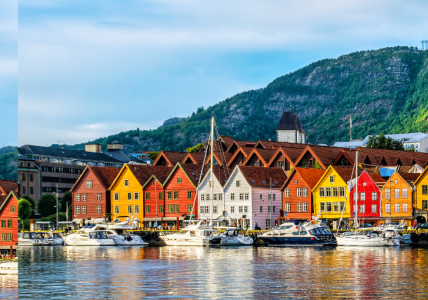Participants in the North Sea Climate Conference showed great resolve to speed and scale up solutions to global heating in the North Sea Region. Involving all stakeholders and daring to set ambitions are important factors. And, as always, money matters.
Last week, as a sweltering heatwave hit Europe, more than 230+ people gathered for the first-ever North Sea Climate Conference. The conference was jointly hosted by the North Sea Commission and Region Västra Götaland with support from the North Sea Region Programme.
An energetic tone was set during the opening dinner, where all speakers expressed a strong commitment to act and work together to tackle climate change.
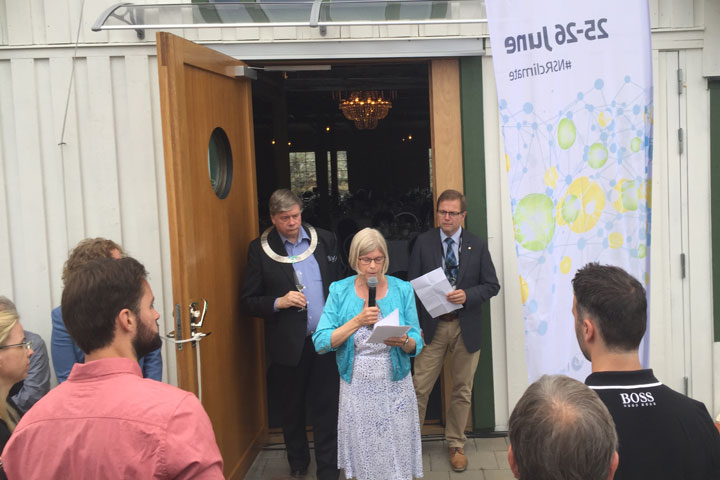
From left.: First Vice President of the Västra Götaland Regional Council Per Tenggren, President of the North Sea Commission Kerstin Brunnström, and Head of the North Sea Region Programme Christian Byrith. Photo by the North Sea Commission.
At the opening, the North Sea Commission also announced an upcoming river cleanup, and the North Sea Region Programme handed out two video awards; both of the winning projects help reduce regional emissions.
The next morning, the plenary room was teeming with energy from the moment people began streaming in. Most delegates had a stake in climate solutions and were eager to discuss the region’s response to global heating.
Young people welcomed on board
Recognising the role of youth in climate discussions, the organisers had invited three young observers from regional youth councils to join the conference, to learn and provide their inputs throughout the day.
The programme also featured Jamie Wylie of the Scottish 2050 Climate Group who advocated a stronger voice for young people in climate policy and action. Citing the global school strikes initiated by Swedish climate activist Greta Thunberg, he pointed out that youth protests have caused a major shift including “the recognition that we are not seeing urgent enough and fast enough action on climate change.”
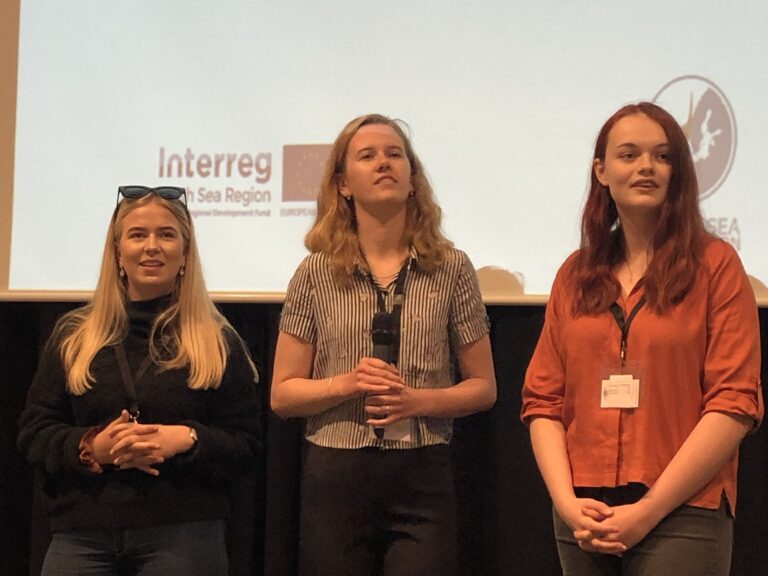
Youth Council observers. From left: Andrea Risholt from Aust-Agder County, Norway, Merit Katerborg from the Dutch Province of Groningen, and Isla Young from Aberdeenshire, Scotland.
Fast-tracking the energy transition
The conference focused very much on how to tackle climate change faster and more effectively than we do today.
Professor Tomas Kåberger of the Swedish Chalmers University of Technology highlighted the plummeting cost of renewable energy, which is very quickly becoming cheaper than oil and gas. “Few understand what a dramatic change has taken place in just the last three years,” he said, stressing that there is “enormous potential of utilising the energy in the North Sea.”
Two speakers showcased exciting new, cost-efficient ocean energy innovations: The company Minesto flies subsea kites energised by ocean currents whilst SeaTwirl produces small offshore wind turbines floating on the sea.
The scene thus seems set for fast expansion of offshore energy in the North Sea. However, the lack of a governance framework for integrated energy planning is a serious barrier to investments.
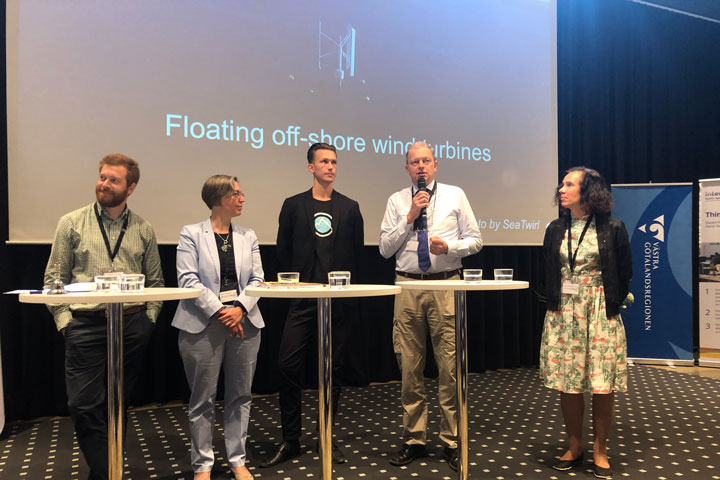
From left: Egon Baldal/Rijkswaterstaat, Katharina Erdmenger/German representation to the EU, Jamie Wylie/2050 Climate Group, Tomas Kåberger/Chalmers University of Technology, and Helena Nilsson/Region Västra Götaland.
The complexities of energy transition were in focus during intense talks in the energy and governance workshops. Claudia Cowie of the North Sea Commission’s Energy and Climate Change Group emphasised that the discussions will be reflected in the Commission’s 2030 Strategy:
“Several points were really interesting for our strategy, including the decommission challenges of wind turbines, linking wind farm supply chains to the local economy, municipalities stimulating community action on energy, and using public procurement to create positive change,” she said.
Changing our ways
A large portion of the regional carbon emissions is caused by human consumption and transport of passengers or goods. What can be done about these?
The food sector is often in focus in climate discussions, and big industry players have a major role to play. Anna Flysjö presented Arla Foods’ carbon net zero milk strategy involving 10,000+ farmers in lowering farm emissions. Many companies are now experimenting with circular business models, like the company Swedish Algae Factory.
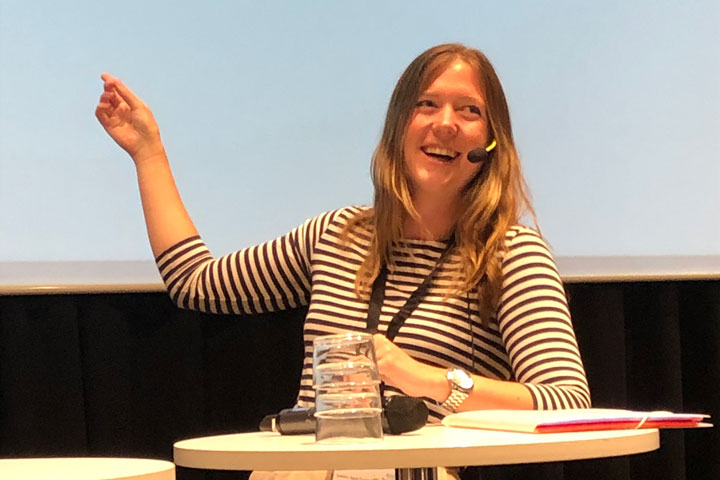
Sofie Allert presented how Swedish Algae Factory is building a circular business based on marine algae used for an amazing array of purposes – e.g. enhancing solar panels, batteries, and skincare products.
In the transport workshop, Michael Glotz-Richter of the City of Bremen said automated road transport can help cut transport emissions by reducing the number of vehicles on the road. “Ultimately, we – the people – are the disruptive element. It’s our use of the technology which determines whether it takes us to hell or to heaven,” he said.
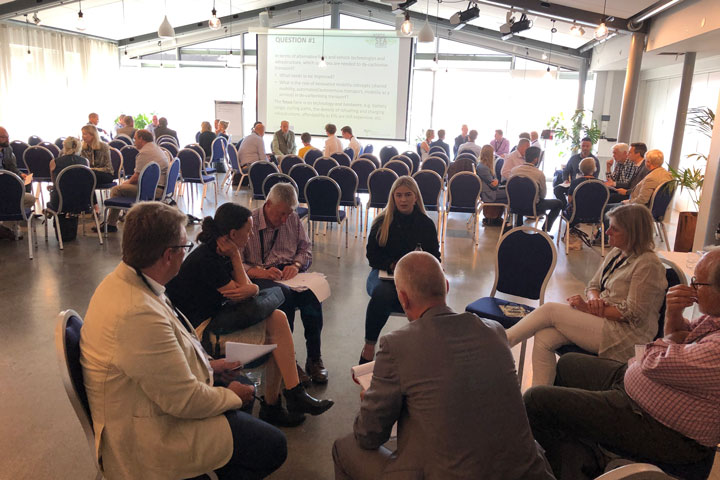
Delegates engaged in in-depth discussions in six thematic workshops.
The human aspect was also prominent in the talks about climate adaptation. Egon Baldal of the Dutch Rijkswaterstaat presented the climate adaptation projects Building with Nature and C5a. Referring to the need to prepare for sea level rise and other effects of global warming, he said, “it’s good to react when our house is on fire; but in the Netherlands we know that we also need insurance!”
In the governance workshop, Liesbeth van Riet Paap, also from Rijkswaterstaat, shared some inspiring Dutch experience with multi-level governance approaches to climate adaptation where citizens are co-developing solutions.
Money, money, money…
The cost of transforming the region into a zero-carbon society cropped up again and again during conference sessions.
Professor Kåberger suggested this might be seen as a strategic public investment leading to ‘first mover’ benefits. He referred to Denmark’s current position as a global leader in wind power, which is based on strong government support to the emerging industry back in the 1990s.
Helena Nilsson of the Swedish Region Västra Götaland highlighted public procurement as a strong regional instrument to fast-track a low-carbon economy. For example, the region now sets a preference for bio-based materials in procurements for the healthcare sector.
Interreg currently finances regional climate action in the framework of at least 30 ongoing North Sea Region projects. But to what extent will the new European Territorial Cooperation (ETC) regulation support this? Katharina Erdmenger, Head of Unit at the German representation to the EU, confirmed that whilst budgets are still pending, “the framework will clearly include lots of opportunity for climate-related projects.”
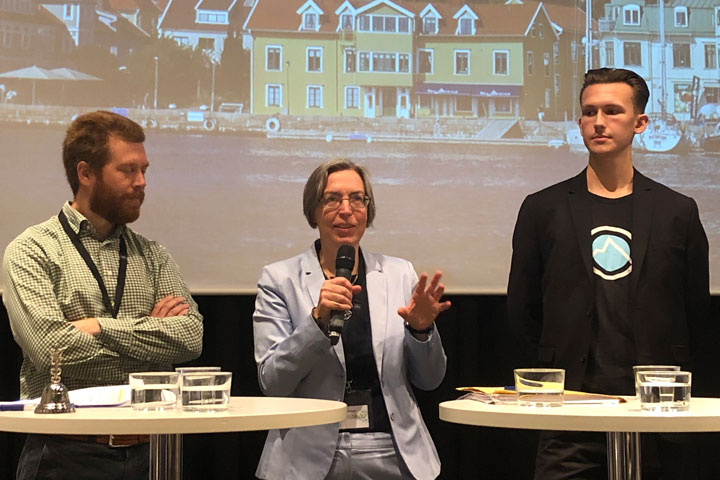
From left: Egon Baldal/Rijkswaterstaat, Katharina Erdmenger / German representation to the EU, and Jamie Wylie /Scottish Climate 2050 group.
It seems clear that a transition at scale and speed requires courageous investment from all actors – business ventures, national and regional governments, and the European Union.
Voices of young people heard and heeded
The conference was designed to spark action and accordingly, each of the six thematic workshops produced a call-to-action. In the final plenary, the audience voted for the statement they felt was most important.
The ‘winning’ statement was: Beyond technical innovation, we mostly need social innovation where citizens, specialists and decision makers become aware that they all need to play their part in outside-the-box solutions for the future. Now!
This message underscored the need to join forces across professions, civil society, and generations. Summing up their impressions, the young observers said, “We have never been in a room with so many adults who really cared about climate change. For a couple of days, we felt really equal sitting in the workshops and meetings. We’re honoured and we want to thank you for that.”
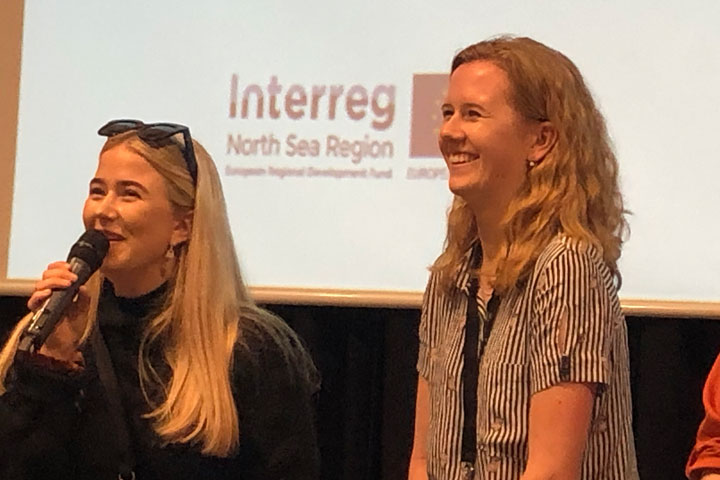
Kerstin Brunnström and Christian Byrith commended the young observers for their constructive inputs in meetings and workshops, and felt that they should be further involved in the future. In her closing speech, Kerstin Brunnström called for more similar gatherings within the next year, to great accolades.
On that note, the first North Sea Climate Conference came to an end, but actions addressing climate risks will continue to grow stronger. Without a doubt the event inspired new networks and closer collaboration empowering regional game-changers to tackle climate change and ensure a vibrant future in the North Sea Region.


